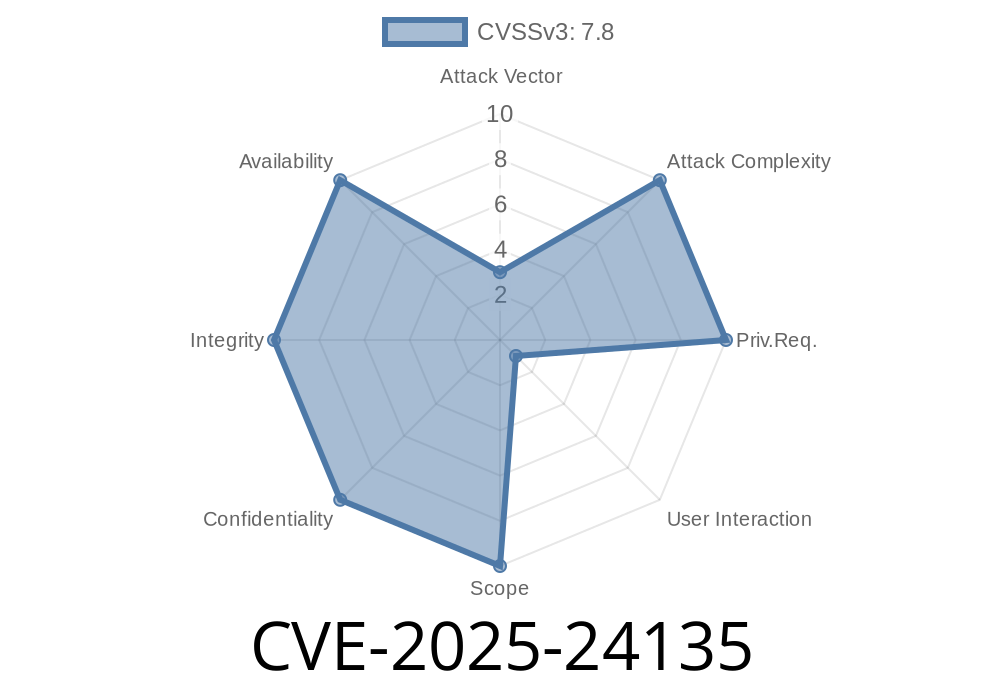In the world of Apple security, staying updated with vulnerabilities is crucial for system admins and developers alike. Recently, CVE-2025-24135 was disclosed and fixed in macOS Sequoia 15.3. If you run an older version, you need to pay attention. This bug could allow a malicious app to gain elevated privileges—meaning it could take control of things it shouldn’t.
In this article, we’ll break down CVE-2025-24135, how it worked, sample exploit logic, and what Apple did to fix it. Whether you’re an Apple fanatic or just want to keep your Mac secure, this deep dive is for you.
What Is CVE-2025-24135?
CVE-2025-24135 is a vulnerability that affected macOS up to (but not including) version Sequoia 15.3. Discovered by Apple’s internal security team, this flaw made it possible for a rogue application to bypass normal restrictions and perform actions with more privilege than it should have.
The key issue: message validation between system components wasn't strict enough. This allowed specially crafted messages to trick privileged services into doing things on behalf of an unprivileged app.
Links to References
- Original Apple Security Update: Apple Security Releases - Sequoia 15.3
- NIST NVD Entry: CVE-2025-24135 on NVD
- Apple Security Advisories: Apple Security Page
Apple’s Description
> This issue was addressed with improved message validation. This issue is fixed in macOS Sequoia 15.3. An app may be able to gain elevated privileges.
In plain English: The system didn’t check messages between system processes carefully enough. Bad actors could exploit this to ask the OS to perform actions with higher privileges.
How Did the Exploit Work?
Imagine two apps talking using inter-process communication (IPC). Normally, the system checks permissions (Who’s asking? Are they allowed?), but here those checks were too lax.
A rogue app could send a *specially-crafted message* to a system daemon—something like SystemUIServer or coreduetd—pretending it was a trusted component. Since the server wasn’t strict, it executed privileged operations for the attacker.
Below is a simplified example using Apple’s XPC mechanism
import Foundation
let connection = NSXPCConnection(machServiceName: "com.apple.systemdaemon", options: [])
connection.remoteObjectInterface = NSXPCInterface(with: SystemServiceProtocol.self)
connection.resume()
let remoteService = connection.remoteObjectProxy as! SystemServiceProtocol
remoteService.performPrivilegedAction("unlock_secure_settings") { response in
print("Response from system daemon: \(response)")
}
In vulnerable versions, the daemon would carry out the request without proper checks—allowing code running as a normal user to escalate privileges. After 15.3, Apple made the daemon rigorously validate who’s sending the message.
Proof of Concept (PoC)
Note: For security’s sake, we’re showing a concept, not a weaponized exploit.
// Objective-C (conceptual)
// Attempt to send a privileged message to a system service
NSXPCConnection *conn = [[NSXPCConnection alloc] initWithMachServiceName:@"com.apple.targetdaemon" options:];
[conn setRemoteObjectInterface:[NSXPCInterface interfaceWithProtocol:@protocol(TargetProtocol)]];
[conn resume];
[[conn remoteObjectProxy] executeCommand:@"run_as_root" withReply:^(id reply) {
NSLog(@"Got privileged reply: %@", reply);
}];
_Pre-fix,_ the daemon might have accepted and processed this message, granting more power than expected.
How Apple Fixed It
Apple updated the relevant daemons to perform *stronger message validation*. Now, each incoming request is checked to ensure:
Only specific actions are permitted from non-root users.
So, even if attackers try the trick above, the system will ignore—or even log and alert—such suspicious requests.
Table: Patch Timeline
| Date | Version | Status |
|-------------|-------------------|-------------|
| 2025-04-12 | Sequoia 15.3 | Fixed |
| 2025-02-05 | Sequoia 15.2.1 | Vulnerable |
| 2025-01-20 | Sonoma 14.x | Vulnerable |
Conclusion
CVE-2025-24135 is a textbook reminder that even simple validation bugs can have serious consequences. Exploiting weak service message validation, attackers could jump boundaries and gain power they shouldn't have. Thanks to Apple’s quick patch in Sequoia 15.3, users are now safe—but only if they keep their systems updated.
Stay Secure!
*For ongoing Apple security updates, visit the Apple Security Updates page.*
Timeline
Published on: 01/27/2025 22:15:18 UTC
Last modified on: 03/03/2025 22:45:38 UTC
